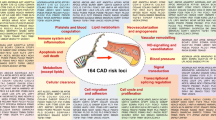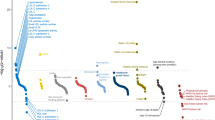Abstract
Genome-wide association studies for coronary artery disease utilizing the case control association study approach has identified 50 genetic risk variants associated with coronary artery disease or myocardial infarction. All of these genetic variants are of genome wide significance and replicated in an independent population. It is of note that 35 of these 50 genetic risk variants act through mechanisms as yet unknown. These findings have great implications for the pathogenesis of atherosclerosis, as well as new targets for the development of novel therapies for the prevention and treatment of CAD. The genetic variant PCSK9 has already led to the development of a monoclonal anti-body which is undergoing assessment in phases I, II, and III clinical trials. This therapy shows very promising results and since it increases removal of LDL-C, it is complementary to current statin therapy. Assessing the beneficial or deleterious effects of a lifelong exposure to a genetic risk variant (Mendelian randomization) will be an important adjunct to clinical trials.
Similar content being viewed by others
References
Papers of particular interest, published recently, have been highlighted as: • Of importance •• Of major importance
Brown MS, Goldstein JL. Familial hypercholesterolemia: a genetic defect in the low-density lipoprotein receptor. N Engl J Med. 1976;294(25):1386–90.
Roberts R. New gains in understanding coronary artery disease, interview with Dr. Robert Roberts. Affymetrix Microarray Bull. 2007;3(2):1–4. Spring.
Dandona S et al. Genomics in coronary artery disease: past, present and future. Can J Cardiol. 2010;26(Suppl A):56A–9A.
Pare G. Genetic analysis of 103 candidate genes for coronary artery disease and associated phenotypes in a founder population reveals a new association between endothelin-1 and high-density lipoprotein cholesterol. Am J Hum Genet. 2007;80(4):673–82.
Samani NJ et al. Genome wide association analysis of coronary artery disease. N Engl J Med. 2007;357(5):443–53.
McPherson R et al. A common allele on chromosome 9 associated with coronary heart disease. Science. 2007;316(5830):1488–91.
Helgadottir A et al. A common variant on chromosome 9p21 affects the risk of myocardial infarction. Science. 2007;316(5830):1491–3.
Helgadottir A et al. The same sequence variant on 9p21 associates with myocardial infarction, abdominal aortic aneurysm and intracranial aneurysm. Nat Genet. 2008;40(2):217–24.
Hinohara K et al. Replication of the association between a chromosome 9p21 polymorphism and coronary artery disease in Japanese and Korean populations. J Hum Genet. 2008;53(4):357–9.
Shen GQ et al. Four SNPs on chromosome 9p21 in a South Korean population implicate a genetic locus that confers high cross-race risk for development of coronary artery disease. Arterioscler Thromb Vasc Biol. 2008;28(2):360–5.
Kumar J et al. Association of polymorphisms in 9p21 region with CAD in North Indian population: replication of SNPs identified through GWAS. Clin Genet. 2011;79(6):588–93.
Roberts R, Stewart AF. Genes and coronary artery disease: where are we? J Am Coll Cardiol. 2012;60(18):1715–21.
Kim JB et al. Effect of 9p21.3 coronary artery disease locus neighboring genes on atherosclerosis in mice. Circulation. 2012;126(15):1896–906.
Visel A et al. Targeted deletion of the 9p21 non-coding coronary artery disease risk interval in mice. Nature. 2010;464(7287):409–12.
Jarinova O et al. Functional analysis of the chromosome 9p21.3 coronary artery disease risk locus. Arterioscler Thromb Vasc Biol. 2009;29(10):1671–7.
Burd CE et al. Expression of linear and novel circular forms of an INK4/ARF-associated non-coding RNA correlates with atherosclerosis risk. PLoS Genet. 2010;6(12):e1001233.
Harismendy O et al. 9p21 DNA variants associated with coronary artery disease impair interferon-gamma signalling response. Nature. 2011;470(7333):264–8. Proposed that interferon-gamma mediates the risk of 9p21 for CAD.
Almontashiri NA et al. Interferon-y activates expression of p15 and p16 regardless of 9p21.3 coronary artery disease risk genotype. J Am Coll Cardiol. 2013;61(2):143–7. These studies indicate the effects of interferon-gamma on expression of P15 and P16 are independent of the 9p21 risk allele.This does not support the hypothesis of 9p21 by Harismendy.
Dandona S et al. Gene dosage of the common variant 9p21 predicts severity of coronary artery disease. J Am Coll Cardiol. 2010;56(6):479–86.
Reilly MP et al. Identification of ADAMTS7 as a novel locus for coronary atherosclerosis and association of ABO with myocardial infarction in the presence of coronary atherosclerosis: two genome-wide association studies. Lancet. 2011;377(9763):383–92.
Horne BD et al. Association of variation in the chromosome 9p21 locus with myocardial infarction versus chronic coronary artery disease. Circ Cardiovasc Genet. 2008;1(2):85–92.
Ardissino D et al. Influence of 9p21.3 genetic variants on clinical and angiographic outcomes in early-onset myocardial infarction. J Am Coll Cardiol. 2011;58(4):426–34.
Chan K et al. Association between the chromosome 9p21 locus and angiographic coronary artery disease burden: a collaborative meta-analysis. J Am Coll Cardiol. 2013;61(9):957–70.
Preuss M et al. Design of the Coronary ARtery DIsease Genome-Wide Replication and Meta-Analysis (CARDIoGRAM) Study: a Genome-wide association meta-analysis involving more than 22 000 cases and 60 000 controls. Circ Cardiovasc Genet. 2010;3(5):475–83.
Schunkert H et al. Large-scale association analysis identifies 13 new susceptibility loci for coronary artery disease. Nat Genet. 2011;43(4):333.8.
Deloukas P, CARDIoGRAMplusC4D Consortium, et al. Large-scale association analysis identified new risk loci for coronary artery disease. Nat Genet. 2013;45(1):25–33. This study involving over 240,000 individuals discovers 15 new genetic risk variants for CAD, and confirms 31 previous genetic risk variants for a total of 46. This study indicates all of the genetic variants are associated with CAD, having a P value of genome wide significance and the association has been replicated in an independent population.
Lu X et al. Genome-wide association study in Han Chinese identifies four new susceptibility loci for coronary artery disease. Nat Genet. 2012;44(8):890–4.
IBC 50 K CAD Consortium. Large-scale gene-centric analysis identifies novel variants for coronary artery disease. PLoS Genet. 2011;7(9):e1002260.
He M et al. ABO blood group and risk of coronary heart disease in two prospective cohort studies. Arterioscler Thromb Vasc Biol. 2012;32(9):2314–20.
Gill JC et al. The effect of ABO blood group on the diagnosis of von Willebrand disease. Blood. 1987;69(6):1691–5.
Ripatti S et al. A multilocus genetic risk score for coronary heart disease: case-control and prospective cohort analyses. Lancet. 2010;376(9750):1393–400.
Thanassoulis G et al. A genetic risk score is associated with incident cardiovascular disease and coronary artery calcium: the Framingham Heart Study. Circ Cardiovasc Genet. 2012;5(1):113–21.
Roberts R. PCSK9 inhibition - a new thrust in the prevention of heart disease: genetics does it again. Can J Cardiol. 2013;29(8):899–901.
Cohen JC et al. Sequence variations in PCSK9, low LDL, and protection against coronary heart disease. N Engl J Med. 2006;354(12):1264–72.
Wierzbicki AS et al. Inhibition of pro-protein convertase subtilisin kexin 9 [corrected] (PCSK-9) as a treatment for hyperlipidaemia. Expert Opin Investig Drugs. 2012;21(5):667–76.
Stein EA et al. Effect of a monoclonal antibody to PCSK9 on LDL cholesterol. N Engl J Med. 2012;366(12):1108–18.
Ni YG et al. A PCSK9-binding antibody that structurally mimics the EGF(A) domain of LDL-receptor reduces LDL cholesterol in vivo. J Lipid Res. 2011;52(1):78–86.
Acknowledgments
In the preparation of this document, the authors would like to acknowledge the efforts of Peggy Offley and Heather Stevenson.
Robert Roberts has received grant support from CIHR #MOP82810 Canada, CFI # 11966 Canada.
Compliance with Ethics Guidelines
ᅟ
Conflict of Interest
Sonny Dandona declares that he has no conflict of interest.
Robert Roberts is a consultant to Cumberland Pharmaceuticals.
Human and Animal Rights and Informed Consent
This article does not contain any studies with human or animal subjects performed by any of the authors.
Author information
Authors and Affiliations
Corresponding author
Additional information
This article is part of the Topical Collection on Diabetes and Cardiovascular Disease
Rights and permissions
About this article
Cite this article
Dandona, S., Roberts, R. The Role of Genetic Risk Factors in Coronary Artery Disease. Curr Cardiol Rep 16, 479 (2014). https://doi.org/10.1007/s11886-014-0479-2
Published:
DOI: https://doi.org/10.1007/s11886-014-0479-2




